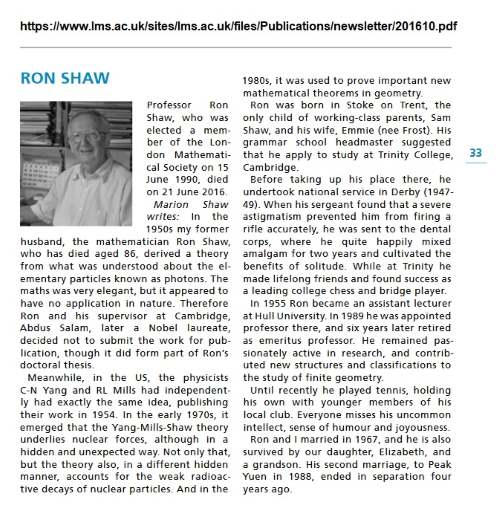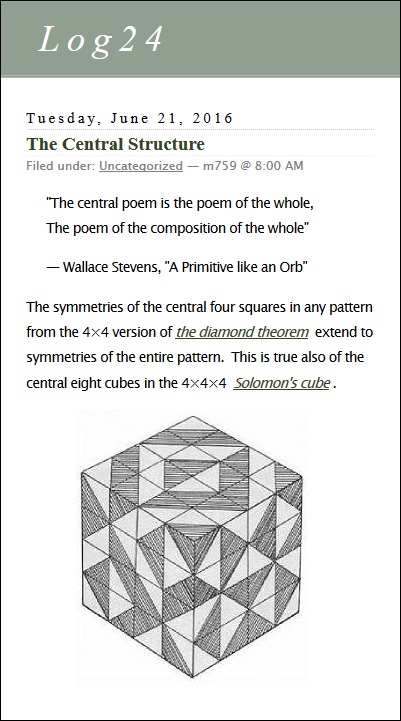See also God’s Dice and Dead Poet Joke .
Monday, November 16, 2020
The Garland Modelling
Tuesday, September 25, 2018
Trinity
See some posts related to three names
associated with Trinity College, Cambridge —
Saturday, September 1, 2018
Ron Shaw — D. 21 June 2016
The date of Ron Shaw's 2016 death appears to be June 21:
All other Internet sources I have seen omit the June 21 date.
This journal on that date —
Thursday, June 21, 2018
Dirac and Geometry (continued)
"Just fancy a scale model of Being
made out of string and cardboard."
— Nanavira Thera, 1 October 1957,
on a model of Kummer's Quartic Surface
mentioned by Eddington

"… a treatise on Kummer's quartic surface."
The "super-mathematician" Eddington did not see fit to mention
the title or the author of the treatise he discussed.
See Hudson + Kummer in this journal.
See also posts tagged Dirac and Geometry.
Saturday, February 17, 2018
The Binary Revolution
Michael Atiyah on the late Ron Shaw —

Phrases by Atiyah related to the importance in mathematics
of the two-element Galois field GF(2) —
- “The digital revolution based on the 2 symbols (0,1)”
- “The algebra of George Boole”
- “Binary codes”
- “Dirac’s spinors, with their up/down dichotomy”
These phrases are from the year-end review of Trinity College,
Cambridge, Trinity Annual Record 2017 .
I prefer other, purely geometric, reasons for the importance of GF(2) —
- The 2×2 square
- The 2x2x2 cube
- The 4×4 square
- The 4x4x4 cube
See Finite Geometry of the Square and Cube.
See also today’s earlier post God’s Dice and Atiyah on the theology of
(Boolean) algebra vs. (Galois) geometry:

God’s Dice
On a Trinity classmate of Ian Macdonald (see previous post)—
Atiyah's eulogy of Shaw in Trinity Annual Record 2017
is on pages 137 through 146. The conclusion —
Thursday, November 30, 2017
The Matrix for Quantum Mystics
Scholia on the title — See Quantum + Mystic in this journal.


"In Vol. I of Structural Anthropology , p. 209, I have shown that
this analysis alone can account for the double aspect of time
representation in all mythical systems: the narrative is both
'in time' (it consists of a succession of events) and 'beyond'
(its value is permanent)." — Claude Lévi-Strauss, 1976
I prefer the earlier, better-known, remarks on time by T. S. Eliot
in Four Quartets , and the following four quartets (from
The Matrix Meets the Grid) —
From a Log24 post of June 26-27, 2017:
A work of Eddington cited in 1974 by von Franz —

See also Dirac and Geometry and Kummer in this journal.
Ron Shaw on Eddington's triads "associated in conjugate pairs" —
For more about hyperbolic and isotropic lines in PG(3,2),
see posts tagged Diamond Theorem Correlation.
For Shaw, in memoriam — See Contrapuntal Interweaving and The Fugue.
Monday, June 26, 2017
Upgrading to Six
This post was suggested by the previous post — Four Dots —
and by the phrase "smallest perfect" in this journal.
Related material (click to enlarge) —
Detail —

From the work of Eddington cited in 1974 by von Franz —

See also Dirac and Geometry and Kummer in this journal.
Updates from the morning of June 27 —
Ron Shaw on Eddington's triads "associated in conjugate pairs" —
For more about hyperbolic and isotropic lines in PG(3,2),
see posts tagged Diamond Theorem Correlation.
For Shaw, in memoriam — See Contrapuntal Interweaving and The Fugue.
Friday, March 4, 2016
Cube Bricks 1984
Related aesthetics —
"Poincaré said that science is no more a collection of facts
than a house is a collection of bricks. The facts have to be
ordered or structured, they have to fit a theory, a construct
(often mathematical) in the human mind. . . .
… Mathematics may be art, but to the general public it is
a black art, more akin to magic and mystery. This presents
a constant challenge to the mathematical community: to
explain how art fits into our subject and what we mean by beauty.
In attempting to bridge this divide I have always found that
architecture is the best of the arts to compare with mathematics.
The analogy between the two subjects is not hard to describe
and enables abstract ideas to be exemplified by bricks and mortar,
in the spirit of the Poincaré quotation I used earlier."
— Sir Michael Atiyah, "The Art of Mathematics"
in the AMS Notices , January 2010
Monday, November 23, 2015
Dirac and Line Geometry
Some background for my post of Nov. 20,
"Anticommuting Dirac Matrices as Skew Lines" —
His earlier paper that Bruins refers to, "Line Geometry
and Quantum Mechanics," is available in a free PDF.
For a biography of Bruins translated by Google, click here.
For some additional historical background going back to
Eddington, see Gary W. Gibbons, "The Kummer
Configuration and the Geometry of Majorana Spinors,"
pages 39-52 in Oziewicz et al., eds., Spinors, Twistors,
Clifford Algebras, and Quantum Deformations:
Proceedings of the Second Max Born Symposium held
near Wrocław, Poland, September 1992 . (Springer, 2012,
originally published by Kluwer in 1993.)
For more-recent remarks on quantum geometry, see a
paper by Saniga cited in today's update to my Nov. 20 post.












